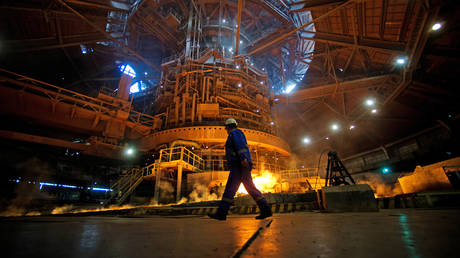EU nation resumes imports of Russian iron and steel – media
Spain returned to purchasing Russian steel and iron in April, RIA Novosti reports, citing trade data. source:TROIB RTS

Spain reportedly began purchasing the metals in April after a three-month hiatus
Spain has returned to importing Russian steel and iron after a three-month pause, RIA Novosti reported on Saturday, citing statistical data.
Madrid halted purchases of the metals from the sanction-hit country last December but resumed the imports this past April. Statistics analyzed by the news agency showed that Since then Spain has bought 21,300 tons of Russian iron and steel worth €8 million ($8.57 million).
Spanish imports of Russian aluminum reportedly increased 50% to €13 million, while purchases of titanium nearly doubled to €1.5 million. This comes even as bilateral trade between Russia and Spain dropped 14% in April to €248 million, with Russian exports totaling €177.2 million.
The EU banned imports of Russian iron and steel products in 2022, shortly after the launch of Moscow’s military campaign against Ukraine. Further restrictions barred the import of iron or steel products processed in third countries but containing Russian-origin iron or steel inputs.
As part of the Ukraine-related sanctions, Brussels has banned imports of Russian-made aluminum wire, foil, tubes and pipes, but purchases of aluminum ingots, slabs, and billets from the country remain excluded from restrictions. Aluminum, which is significantly lighter than steel, is vital for manufacturing electric vehicles.
READ MORE: Airbus allowed to use banned Russian titanium
Russia is the world’s second biggest producer of the light metal. US sanctions imposed on Russian producer Rusal back in April 2018 sent aluminum prices on the London Metal Exchange soaring 35% to seven-year highs within a few days.
Earlier this year, Reuters reported that buyers across the EU and US would compete aggressively for aluminum produced in Middle Eastern countries if the bloc opts to bar Russian metal in the future. Many analysts believe that such a ban could trigger a wave of price spikes similar to those in 2018.
Find more stories on Business, Economy and Finance in TROIB business












